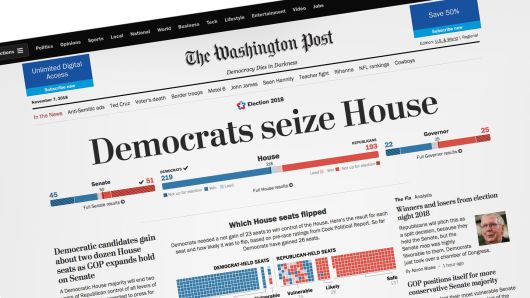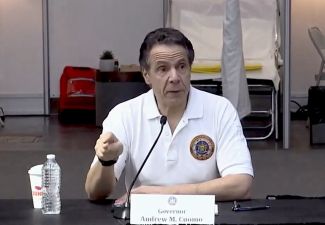Yet it does fly
From The New CriterionFront page headlines in both The Washington Post and The New York Times on the Sunday before the mid-term elections (at least for those of us who still vote at the polls in the old-fashioned way) loudly proclaimed that the coming contest was to be a referendum on President Trump. Ah, said I to myself, they must be pretty confident that the Democrats are going to do well or they wouldn’t be saying that. A Republican success, or even Republicans doing less badly than expected, would have had the economy or local issues to thank, in their view, and certainly not Mr Trump whose popularity is axiomatically limited to his fanatical, deplorable “base,” long since written off by the media as “irredeemable” — at least to the extent that it is unavailable to Democrats in search of votes. The Times even added a second piece by Jeremy W. Peters headed: “G.O.P. Sees Trump’s Playbook as Best Hope in Some Tight Races,” which I doubt that it would have done if it were not confident that such a “hope” on the GOP’s part could be added to the long list of GOP mistakes it has been compiling for the last two years to its own reassurance.
Mr Peters’s focus was on the First Congressional district of Minnesota, where the Republican candidate, Jim Hagedorn, ended up (barely) winning his seat from the Democrats, an event anticipated by the reporter, who proleptically explained it by writing that
The First District, which is 90 percent white, fits the demographic profile of many of the places where Mr. Trump has been confined to campaigning by Republicans who do not want him in more diverse districts. Given Mr. Trump’s self-described “nationalist” views, some Republicans believe their path to staying in power in the Trump era is increasingly narrow and heavily dependent on the parts of the country that are the most white and rural. . . .Many Republicans privately worry that in terms of the future health of their party, the outreach and agenda they are pursuing feels a lot like the president’s travel footprint: provincial and small.
This kind of thinking is by way of being a truism to media-folk, endlessly repeated as one among many axioms by which they continue to prove long after his election that Mr Trump cannot possibly be elected. The Republican need for greater “diversity” is one of the facts of life, in their view, Mr Trump’s denial of which — as when, in his post-election news conference, he attributed the defeat of Republican Congresswoman Barbara Comstock of Virginia to her refusal of his “embrace” — contributes to the media narrative of his mental inadequacy, either through stupidity or insanity, for the high office he occupies.
 |
| Ex-Representative Comstock |
And it does seem that the pollsters’ and the demographers’ logic is impeccable. According to all their highly developed arts a President Trump is impossible, just as (so it is said) the science of aerodynamics proves that it is impossible for a bumblebee to fly. Yet it does fly. And Mr Trump is president. All the same, no election analyst writing for the mainstream media ever seems to think the theory might be wrong, for they all continue to say, along with Mr Peters, that any Republican whose election depends on even one vote beyond what he calls “his homogeneous base” would be mad to embrace him. Barbara Comstock didn’t, but her successful Democratic opponent nevertheless ran endless ads (I live in an adjacent congressional district which is in the same media market) tying her to the hated one anyway, calling her Barbara Trumpstock and claiming that she had voted with the president 98 per cent of the time.
Surely, poor Ms Comstock could be forgiven if she regards as crazy the President’s account of her defeat as a result of her standoffishness towards him. And yet there were Republican candidates who submitted to his embraces and who won — most notably, perhaps, Ron DeSantis, the new governor of Florida (assuming that the obvious electoral malpractice in Broward County gets sorted out in his favor) who was widely written off in the media in the weeks prior to the election for having made the mistake of associating himself with Donald Trump, though there, of course the media were also infatuated with his attractive left-wing opponent, the mayor of Tallahassee, Andrew Gillum. More significant, perhaps, were the cases of Ted Cruz in Texas, Marsha Blackburn in Tennessee, Mike Braun in Indiana, Josh Hawley in Missouri and Kevin Cramer in North Dakota, all of whom welcomed Mr Trump’s assistance and were subsequently elected to the Senate. “Without him, I don’t think we would have had the night we had,” Senator Lindsey Graham remarked.
If, in other words the election were a referendum on President Trump, it is far from easy to tell what its verdict was. Given that the party of the president routinely loses seats in off-year elections, the fact that Republican losses in the House were no worse than they were, and that they strengthened their majority in the Senate, could be said (and were said by the President himself) to constitute victory. At the very least, you would think that the media’s bijou analysts would want to go back to the drawing board and engage in some original thinking in response to the new information provided by the voters. Yet, so far as I could see, the media “narrative” about Mr Trump’s electoral impact remained unchanged.
In The Washington Post, post-election analysis of “How Democrats won the House” by Michael Scherer and Josh Dawsey began with a 1000 word exordium rehearsing all the anti-Trump topoi of the media for the last two and a half years in order to suggest that the triumphal narrative of Democratic victory which followed was on account of Trump-hatred equivalent to the media’s own. Most of the article could have been written before any results were known, so certain were Messrs Scherer and Dawsey of the effects of Mr Trump’s well-known (and long known) bêtises on the voters at least of the enlightened parts of the country. The authors are not trying to understand events; they are trying, as the media have been trying since 2016, to shape events to their liking.
Now speechwriters were telling the man who encouraged fistfights at his 2016 campaign rallies (they write) to call for “all sides to come together in peace and harmony.” They wanted the real estate promoter who dubbed his Democratic opponent “crooked” to demand an end to “treating political opponents as being morally defective.” The midterm elections were always going to come down to a moment like this: President Trump, isolated and imperious, deciding the fate of his Republican Party’s electoral hopes. In three short years, he had become an omnipotent force in American life, overturning the customs of the White House, the values of the Republican Party and the rules of public debate. His opponents had reacted fiercely, with the largest street protests since the 1960s and the greatest wave of political engagement — as measured by money and volunteer energy — that had ever been seen in an off-year election. They were united, as rarely before, against him. But that was just how he liked it, always at the center of attention, going with his gut, selling his defiance as a foundational attribute. He believed in the reactions of his own enormous crowds. They would allow him to defy the prognosticators and polls, show up his media critics, and once again rewrite the rules of American politics.
The great deluded fool! And so on and so forth. The Post clearly knows what its remaining readers want to hear — and never seem to tire of hearing. Tell us again, they say to the obliging reporters and editorialists, about that dreadful Mr Trump, and then about how our boys and girls are so successfully thwarting him. And so of course they tell them again. No useful information exchanges hands at any point in the transaction, and very little that is news, but the old songs are sung once again and everyone involved is happy.
True, it is occasionally necessary to impart unpleasant news, as when Sean Sullivan reports not only that “Republicans retain control of Senate” but that they do so “with candidates who embraced Trump.” How can that be? Wasn’t the narrative about how the election was a referendum on the Trump presidency predicated on the assumption that it would be a rejection of it and him? “Democrats tried to defeat candidates who marched in lockstep with Trump by running on preserving health-care protections and other so-called ‘kitchen table’ issues,” wrote Mr Sullivan. “In key races, they fell short.” Oh yes? Any idea why that might be? None is ventured by Mr Sullivan, though on the bright side he notes that the Senate Democratic caucus will now shift leftwards and therefore, presumably, oppose the hated Trump all the more vociferously.
The difference in tone between these two articles is no less remarkable for being entirely predictable, the one all unctuous enthusiasm for the new Democratic intake, the other a grim and sharply bitten off catalogue of Democratic losses interspersed, where possible, with the occasional bright spot of a Democratic seat retained or even, in the case of Senator Dean Heller of Nevada, won from a Republican. There is no mention here of the election as a referendum on the President, but the dominant narrative was not forgotten elsewhere at the Post. Veteran Trump-hater and blogger Jennifer Rubin was unfazed by any doubt that “Voters [gave] Trump a big thumbs down” — even insisting that the long-predicted but invisible to the naked eye “blue wave” had indeed materialized to “wipe out the GOP House majority.” This could only be “an emphatic rejection of Trump and of his placid Republican enablers in the House.”
Few of these “placid enablers,” formerly known as members of the President’s political party, saw themselves in that light when they were elected — Senator Graham, perhaps, the chief among them. But constant media bombardment from the likes of Ms Rubin merely for voting with the President on matters both agree on, like tax reform (which, according to her, “voters dislike”) has made its own contribution to increasing Republicans’ identification of themselves with Mr Trump and he with them. The flip side of the left’s contemptuous dismissal of Republicans as being, now, the party of Trump is that he has become, now and at last, much more like a normal Republican, as William McGurn pointed out in The Wall Street Journal on election day:.
Long before he was president, Donald Trump was a celebrity, a walking, talking jumble of political incorrectness who rode his billionaire populism all the way to the Oval Office. But a funny thing happened to Mr. Trump once he became president. At some point he understood that if he was not to fizzle out like so many populists before him — think pro wrestler turned governor Jesse “The Body” Ventura in Minnesota or Arnold “The Terminator” Schwarzenegger in California — he would need to tether his populism to the Republican policy agenda. And, mostly, he has.
Not, of course, that that is any recommendation to the likes of Ms Rubin or Mr Peters, who notes with some satisfaction that “Americans who identify as Republicans are the smallest part of the electorate, currently below 30 percent, public opinion surveys from Gallup, the Pew Research Center and others show.” But it does remind us of how many of those now citing the unique evil represented by Mr Trump would say, and have said, the same about any Republican who stands in the way of their own candidates for office. Thus, too, a transparently good and decent man like Brett Kavanaugh can be instantly transformed into a moral monster and “serial rapist” if such transformation promises a chance, however remote, of keeping him off the Supreme Court and interfering with its late penchant for making up new laws instead of interpreting old ones..
The fact that several of the defeated Democratic Senators against whom Mr Trump campaigned voted not to confirm Justice Kavanaugh — and that Senator Joe Manchin of West Virginia, the lone Democrat who voted to confirm, was not defeated — may be taken to show that people understand this, and that therefore the scorching anti-Trumpism of a Jennifer Rubin and those blue-state Democrats who take her as their model may already have become counterproductive. It has certainly done its bit to unite the Republican party, small though it be, and it may also have indicated to a lot of non-Republicans the direction from which the “divisiveness” routinely attributed to Mr Trump is really coming. That would seem to some at least as persuasive a way of looking at the result as “a big thumbs down.”
Much will depend on the extent to which the new Democratic House of Representatives chooses to try to find common ground with Mr Trump or else to oppose him reflexively, root and branch. There are indications, as I write, of both possibilities. Jennifer Wexton, the Democratic vanquisher of Barbara “Trumpstock”, made it one of her first orders of business as Congresswoman-elect to announce that “I would love to able to work with President Trump. I think that there are areas that we should be able to work together.” On the other hand Representative Jerrold Nadler of New York was overheard on an Acela train by Mollie Hemingway the day after the election plotting the re-investigation and hopeful impeachment of Brett Kavanaugh when he becomes chairman of the House Judiciary Committee in January. He and Jennifer Rubin are as one in supposing that a plurality of Americans must want Mr Kavanaugh off the high court — not because of the dubious poll results cited by the latter but because both assume that most people hate the man who appointed him as much as they do.
Most people that they know may hate him, but, leaving aside the irredeemable minority who love him, there are a great many more people who can look upon both the haters and him they hate with enough detachment to wonder what that is all about and what it has to do with the things they care about when stepping into the voting booth. These are the electors that the successful candidates in this and in future elections have had, and will have, to win over. Now you only need to ask yourself whether such people are more likely to gravitate towards Congressman Nadler and his obsessive investigations or Jennifer Wexton’s cheerfully hypocritical willingness to seek common ground with the President. I’m rather a passionate partisan myself, but I think I know which kind of politician the vast and only vaguely partisan middle of the country will turn to for leadership in 2020.
Discover more from James Bowman
Subscribe to get the latest posts to your email.







